Carisoprodol – All You Need to Know About4 min read

The general form of the prescription drug soma is known as carisoprodol, which is used for alleviating pain from muscle spasms and relaxing muscles.
Carisoprodol is from the group of drugs called muscle relaxants.
The Food and Drug Administration (FDA)-approved Media Pharmaceuticals manufacture drug.
The ‘Carisoprodol High’ and Abuse
Among all muscle relaxants, carisoprodol is known for having the greatest abuse potential and causing drowsiness.
As put forward by the anecdotal reports, drug abusers usually combine carisoprodol with two other medications, hydrocodone and benzodiazepine alprazolam (Xanax), to prepare a cocktail called “The Holy Cocktail” or “The Trinity.” Considering its potential for abuse, carisoprodol is an FDA-scheduled drug, but it is subject to the Controlled Substances Act.
Make sure to keep the drug away from teenagers, children, or anyone for whom it may not be prescribed as there are some serious risks and side effects involved.
Carisoprodol Warnings
If you are allergic to carisoprodol or any of the ingredients, you should completely avoid using it.
However, if you are not allergic but have any of the following conditions, consider referring to a physician before taking the drug.
- Acute intermittent porphyria
- A history of substance or drug abuse
- A risk or history of seizures
- Poor liver function
- Poor kidney function
- Sensitivity to the drug felbamate (Felbatol)
- Sensitivity to the drug meprobamate
Moreover, if you have any physical disabilities or are of advanced age, it is suggested to take carisoprodol with special care under a doctor’s guidance.
While it is uncertain if the drug causes any harm to an unborn baby or fetus, you should notify your doctor if you are pregnant or planning to become pregnant before taking the medication.
Also, breastfeeding mothers are recommended to consult a physician.
Side Effects
The common side effects of carisoprodol include headache, drowsiness, sleepiness, and dizziness.
If these conditions are persistent or become severe, you need to speak to your doctor and seek medical care immediately.
Some people may also experience dry eyes, constipation, dry mouth, and trouble in urinating.
Another condition is a severe skin reaction where the skin peels, becomes extremely red or develops large bumps and blisters.
This life-threatening condition is known as erythema multiforme. Other symptoms are swelling of the tongue, lips, and mouth (also called angioedema), feeling of confusion and agitation, extreme weakness, paralysis, and poor coordination.
You may also experience seizures, lightheadedness while standing and sitting new infections, or fatigue after taking the medication.
It is not uncommon to feel ‘weird’ when you stop taking carisoprodol after consuming it for a long time.
Carisoprodol Interactions
It is always important to discuss all of your treatments with your pharmacist and doctor, including any over-the-counter (OTC) medications (nutritional shakes, vitamins, protein powders, herbal treatments, etc. medicines) as well as any recreational or illegal drugs.
When you are using carisoprodol, it is advisable to avoid the intake of clopidogrel (Plavix), drugs that contain doxylamine, carbinoxamine, sodium oxybate (Xyrem), and ticlopidine (Ticlid).
Carisoprodol is known for interacting with various groups of drugs such as:
- Sleep medications like opiates
- Anxiety medications, including benzodiazepines
- Drugs that enhance wakefulness such as armodafinil (Nuvigil) and modafinil (Provigil)
- Medications that are taken for psychological conditions such as depression
- Drugs that can cure seizures and muscle disorders
- Analgesics or pain killers
- Other drugs that can dull the nervous system or act on brain receptors such as guanabenz, guanfacine (Tenex, Estulic, Intuniv), apomorphine (Apokyn), and methyldopa (Aldomet)
Drugs like belatacept (Nulojix) and adalimumab (Humira) that suppress your immune system and allergy medicines also interact with carisoprodol.
Individuals taking the chemotherapy drug acrivastine are advised to avoid taking carisoprodol at the same time.
Other drugs that can interact with carisoprodol are tocilizumab (Actemra) and thalidomide (Thalidomid).
Furthermore, drinking alcohol while you are taking the medication can worsen your nervous system and impair movement and increase drowsiness.
Make sure you restrict your consumption of alcohol with the intake of carisoprodol.
Furthermore, grapefruit juice is commonly believed to interact with the drug. Still, both the juice and the medication are broken down through different pathways in the liver, so it is not likely for a reaction to occur.
Medications such as the prescription drug rifampin (Rifadin) and herbal supplement St. John’s wort may reduce carisoprodol’s ability to work.
Dosage
Carisoprodol comes in 250 and 350 mg tablets.
The recommendation is to take the tablet with a full water glass, whether you have eaten anything or not.
It is better if you have not eaten since eating can delay the effects of the medicine.